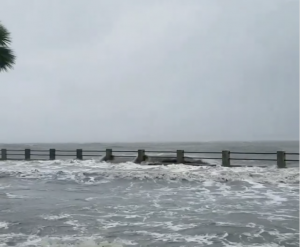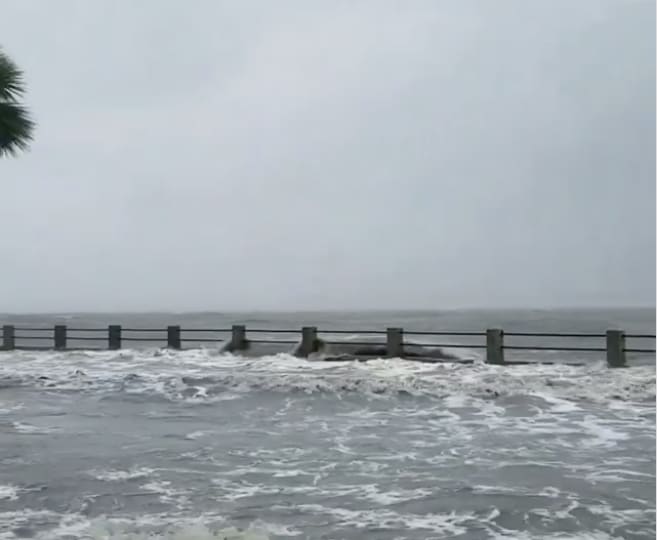Storm of the century! This one will be worse than Hugo (chilling words for a South Carolinian)! The Carolinas have never seen one this bad! Anticipated to be the most expensive storm ever. Evacuate now before it’s too late!
Hard to imagine you can joke about words like these but last night my friend said to me, “it’s that time of year again.”
This is the third storm in three years that has been forecast to hit our city of Charleston, South Carolina with predictions of mass destruction. Of these storms, this is the second time we will be hit on Shabbos Shuva (bo ba’yom, on the exact day) and last year, we were hit with a storm right before Rosh Hashana. It seems preparing for a hurricane has become as much a part of my Yamim Noraim (High Holy days) preparation as learning Al HaTeshuva, listening to Rabbi Frand’s Teshuva drasha and cooking. We have become pros. And for more reason than one, this is not a good thing.
With the dire forecast of Hurricane Matthew three years ago, we were terrified. It was our first hurricane in Charleston, (although we had been through Hurricane Ike in Houston years before) and we had heard horror stories about Hurricane Hugo which had pummeled Charleston in 1989. Coming so soon after we had uttered, “Mi yichye u’mi yamut… mi ba’mayim, mi ba’esh”… who will live, who will die, who by fire, who by water, and predicted to hit on Shabbos Shuva, no less, it felt like a frightening sign from G-d. We evacuated to Charlotte to the home of Rabbi and Sara Oppenheim, who are truly an Avraham and Sarah of our time. We learned a lot about kiruv from them and felt truly inspired (and humbled!) by their generosity and warm home. But while we had a beautiful Shabbos, we worried about those who had chosen to stay back in Charleston. Every time the wind blew in Charlotte, I worried about the wind blowing even stronger in Charleston. As soon as Shabbos ended, I ran to my phone and anxiously checked in with our community. They laughed at me. It was windy and it flooded, they said, but not to worry, they had minyanim throughout Shabbos. Just some of them had to walk through a bit of flood water to get there.
I should have known.
When Hurricane Irma was approaching us last year, we had already become tougher and wiser Southerners and knew better than to believe the news stations. Although we live downtown in a flood zone and our street floods nearly every time it rains in the summer (college kids actually like to kayak through the flood water), our house is several stories high and the first floor is built to accommodate flooding. We felt we would be fine to stay home and watch the storm from our house. Indeed, the storm did not even hit us at tropical storm strength (this is after a strong hurricane was predicted to decimate our community), although the storm did approach at high tide and there was tremendous storm surge. Unwilling to give up a day without my daily walk, I walked to the Charleston Battery just before the storm hit and got to witness the initial fury of the storm as it approached the Charleston Harbor, with the choppy waves crashing over the walkway where I walk and daven every day. On the way home, the winds got stronger and at certain points, I had to brace myself and even hold on as the winds were strong enough to move my entire body. While it was awesome to experience Hashem’s power like that, I will admit, it probably wasn’t the smartest move. Throughout the storm, there were scary moments, such as when we were under tornado warnings and we made our whole family huddle in the bathroom, which has no windows (real Charlestonians don’t do that) but we even got tired of those and started to walk around the house freely despite the continued warnings. The fear wore off. The storm passed with little damage; we were lucky.

And so this year, when yet again, the news stations began predictions of the Category 4 Hurricane Florence, possibly even hitting as a Category 5, and the worst storm since Hugo (again), we took the warnings with a grain of salt. We were tired after working hard on Rosh Hashana and fasting on Tzom Gedalia and it’s a hassle to evacuate- to sit in massive traffic on the way out and upon return, and after two times of weathermen “crying wolf” and seeing that this storm looked more like a Cat 2 (if that) then the 4 they were predicting, we just weren’t all that eager to pack up and leave town (just to be clear, we do follow the reports from a meteorologist who is a member of the Jewish community in Charleston and he always offers accurate weather reports without hype). And that’s why we are still in Charleston, as I sit on my porch this Thursday afternoon, writing this piece. We have received calls, emails and texts from friends and family (and even a CNN representative!) asking if we are OK, offering their homes for us and our community to evacuate, sharing their concern and Tefillot (prayers). We find their concern touching and heartwarming and truly appreciate the Tefillot (maybe that’s what’s keeping the storm away!). But we, like many of our friends here, are not too concerned. Yes, it will probably be bad weather on Shabbos. Yes, we may go out of our minds being stuck inside for so many days. We may lose power and have to eat cold food on Shabbos. It won’t be fun but we feel comfortable with our decision to stay (whether or not this was a good idea remains to be seen).
But while I have learned to discount the hysteria of the weathermen, I take the knowledge that Hashem is trying to impart a message very seriously. Three hurricanes over three years; two on Shabbos Shuva. Certainly, this is meant to impact our Yamim Noraim and make them more meaningful.
And perhaps it is just that calm and complacency that we are feeling now as we await the storm that is what we need to guard against as we enter the Yamim Noraim.
A fellow Rebbetzin in a different state threatened by the storm, shared with me that her husband spoke on Rosh Hashana about how frightened they were as the hurricane approached and the uncertainty and fear they felt and this feeling should inspire the community to do Teshuva. My husband spoke about the same idea after Hurricane Matthew, three years ago on Yom Kippur, and we all nodded along, feeling as if we had been snatched from the jaws of death and destruction. While it is undoubtedly as true this year as it was then, on our third storm in three years, our nerves have become deadened to the threats facing us.
How can I feel this way, I wonder? I’ve seen what happened to Houston, the community where we lived for four years, when a storm lingered there causing mass flooding. The same thing could happen to our community! I should be terrified. And my lack of fear reminds me of the words in last week’s parsha, Nitzavim, “Shalom yihiye li” – we hear the admonitions of the Torah and we assuredly and confidently (and foolishly) feel, oh, but we will be fine.
But more than inspiring me to fear this storm, these thoughts make me fear an even greater storm coming our way: Yom Kippur.
Year after year, we stand in shul on Yom Kippur and we utter the words of U’Nesane Tokef but how many of us really internalize the words? Do we really enter the Yamim Noraim season with the cognizance of what’s at stake? I look around my shul and see the empty seats of those who were healthy last year, and who this year, are no longer with us. I think of those who were strong and laughing with friends in shul last year but have been stricken with illness over this past year. We walk into Yom Kippur and we have no idea what we are facing in the coming year: if in the blink of an eye, the stock market will crash and we will lose our fortunes, illness will come and we will lose our health, our jobs will become obsolete, our marriages will fall apart, a storm will come to destroy much of what we hold dear, rachmana l’tzlan (may Hashem protect us). We see with our own eyes what could happen, but do we truly believe it could happen to us? If we did, would we be so quick to spend our time counting how many pages are left in the Machzor, checking our watches to see how many hours are left to the fast and bemoaning how hungry we are?
We think we are in control, we think we have it all planned and then out of nowhere, a swirling mass of wind and water form an eye and charges at us and we suddenly realize how frail man is. With all of our technology and knowledge of science and intelligence, we can’t stop a storm. We can barely even predict where it will go and how fiercely it will hit. I think about millions evacuating and the storm changing direction, as it has these past three years, and the words of the Tochacha that you will run away without anyone chasing you. And I think of those who stayed behind in a school in McClellanville during Hurricane Hugo, and nearly drowned from the storm surge and our friends in Houston who had to be rescued by boat during Hurricane Harvey. If there’s anything a storm teaches you, it’s that we just don’t know. It’s that everything can change in an instant. It’s that we have no control.
As we step into Yom Kippur, we realize the only power we truly have is the machzor (prayerbook) in our hands, the utterance of our lips and the sincerity in our hearts. We stand before G-d, realizing that all of the power we may feel in our lives, in our jobs and in our homes is an illusion. Our wealth and health and worldly possessions can all be gone in an instant. It’s a sobering thought. But sometimes we need a wake-up call to shove us out of our complacency and to realize what is true in life. To get us to re-examine our ways, to make the most of the days we are put on this earth, to fulfill our life’s purpose rather than wasting our time on the nonsense that can occupy our thoughts, time and emotion.
I hope and pray that everyone in the storm’s path (wherever that may be) remains safe and there is little damage. But I also pray that we seek out our own take-home messages from Hashem sending us a hurricane during these days of Awe, and take those messages to heart.
Gmar chasima tova to all; wishing y’all a meaningful Tefilla and fast, and may Hashem answer kol mishaalos li’beinu l’tova – all of our heartfelt prayers, for the good.
Note: To all of those who have reached out to me to share that you’re davening for our community, thank you! Please also daven for Esther Leah bas Rachel who is in surgery on Friday and needs a refuah shelaima.
Ariela Davis is the Director of Judaics at Addlestone Hebrew Academy and the Rebbetzin of Brith Sholom Beth Israel, the historic shul of downtown Charleston, South Carolina. She writes and speaks about issues related to Israel, the Holocaust and Jewish thought. She can be reached at arieladavis@gmail.com.
The words of this author reflect his/her own opinions and do not necessarily represent the official position of the Orthodox Union.
